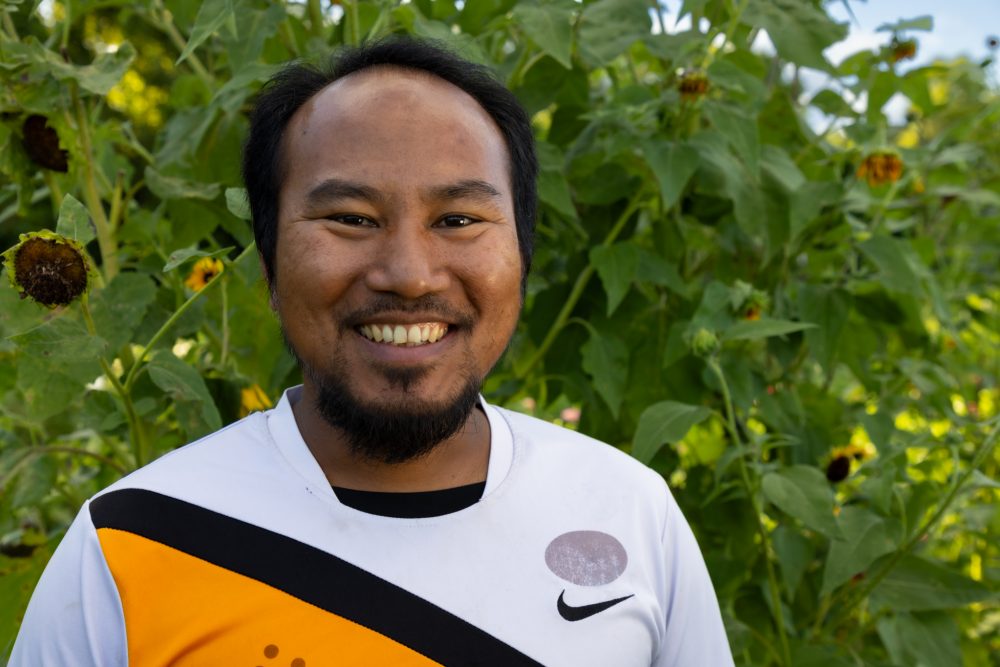I Became a Farmer When They Told Me It Wasn’t Possible

My name is Ca Saw. About 8 months ago, I got US citizenship and I changed my name to Abel Ca Saw Kyawkyawoo. Kyawkyawoo is a Burmese name I used in school. Ca Saw means brother, which is how they know me at New Roots. And Abel is a Bible name. Some people can’t pronounce Ca Saw. So for them, I have Abel.
I lived in Burma until 2010, around 20 years, until the Civil War. I am of the minority race (Chin) and the minority religion (Christian) - because of this, it wasn’t safe for me. And no matter how much education I got, I would always receive the lowest positions in Burma. I came to the US alone. My mom is still in Burma, still moving around constantly because of the unrest. We Facetime, and I hope to visit now that I am a citizen, if it is ever safe.
From there, I went to Malaysia for five years. In Malaysia we didn’t live in a camp. But it wasn’t safe for us. Bad people would ask for money and then take whatever they wanted, sometimes the police did this too.
When I arrived in the US my caseworker asked me what I wanted to do here in the United States.
I told her I wanted to be a farmer. She said there was no way. Here farmers are rich people. I thought she was kidding. In Burma, the rich people don't farm.
I tried working in a restaurant, working construction and driving a semi-truck but those jobs were not for me. When I was younger, I wanted to be a teacher.
In Burma, most people are farmers, I would say 99% grow corn and cucumber, sometimes chilis. But, my father was in the military, so my family didn’t farm. In 2004 or 2005 I got a book from the library in Burmese, “How to Grow”. And I tried, but that year there was too much water and I failed. That time I gave up, and just played soccer in my spare time.
But here, at New Roots, they teach me and I take it all in. I learn about crop rotation and to not use chemicals. It’s different here than in Burma, you have to pay attention to the seasons. I saw snow for the first time here. I was happy, I’d never seen snow and I still like it for the first month. If it weren’t for New Roots I wouldn’t have stayed here.
Now I help teach farming because I’m the assistant manager. I am in charge of the water. In the summer I have to stay later because people are here working later. My favorite things to grow are broccoli, cauliflower, and potatoes, but not sweet potatoes.
In the growing season I save a lot of money, especially with everything coming up in price. I also sell, but I am not big enough to sell wholesale. Farming is hard work, but it also gives me flexibility and freedom. My baby can come help me when she gets bigger, she wouldn’t be able to do that with a lot of other jobs.
I want to buy a piece of land, no more than 20 acres. And have 2-3 acres for chickens and 2-3 acres for pigs.
Here, in the US I have opportunities. In Burma I was born in a religion and culture that others didn’t value and so I was restrained in what I could do. There I couldn’t go to a bank and borrow. Here, I have people and organizations to help, like Catholic Charities and New Roots.
Here, people share. Generally, in my country, they are kind, but they don’t share. If they grow something they keep it. If they have information, they keep it, and that’s fine. A Lot of people are still in the mindset of I have to take care of myself and I’m not going to share with others because then they could be a threat to me. It’s different cultures.
But, someday, I want to teach my village what I have learned about farming.
Our team members obtain informed consent from each individual before an interview takes place. Individuals dictate where their stories may be shared and what personal information they wish to keep private. In situations where the individual is at risk and/or wishes to remain anonymous, alias names are used and other identifying information is removed from interviews immediately after they are received by TSOS. We have also committed not to use refugee images or stories for fundraising purposes without explicit permission. Our top priority is to protect and honor the wishes of our interview subjects.